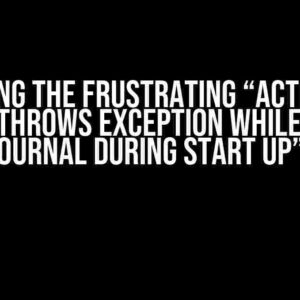Are you struggling to get your Hibernate search query to filter data based on multiple fields in a list? You’re not alone! Many developers have been in your shoes, scratching their heads, wondering why their query isn’t working as expected. Fear not, dear reader, for we’re about to embark on a journey to debug and resolve this issue together.
Understanding the Problem
Before we dive into the solution, let’s first understand the problem. You have a Hibernate search query that is supposed to filter data based on multiple fields in a list. However, for some reason, the query is not working as expected. You’ve tried tweaking the query, but nothing seems to be working.
Here’s an example of what your query might look like:
FullTextQuery query = getFullTextEntityManager()
.createFullTextQuery(new BooleanJunction()
.add(fqt("field1", "value1"))
.add(fqt("field2", "value2"))
.add(fqt("field3", "value3"))
.createQuery(), MyClass.class);
In this example, we’re using a `BooleanJunction` to create a conjunction of multiple filters. However, for some reason, the query is not filtering the data as expected.
Common Pitfalls
Before we dive into the solution, let’s cover some common pitfalls that might be causing the issue:
- Indexing issues: Make sure that the fields you’re filtering on are properly indexed. If the fields are not indexed, Hibernate Search will not be able to filter on them.
- Analyzer issues: Ensure that the analyzer you’re using is correct for the field types you’re filtering on. For example, if you’re filtering on a string field, you might need to use a `StandardAnalyzer`.
- Query syntax issues: Triple-check your query syntax to ensure that it’s correct. A single mistake can cause the query to fail.
Debugging Techniques
Now that we’ve covered common pitfalls, let’s dive into some debugging techniques to help you identify the issue:
Enable Hibernate Search Logging
One of the most effective ways to debug Hibernate Search issues is to enable logging. You can do this by adding the following configuration to your `persistence.xml` file:
<property name="hibernate.search.logging.level" value="DEBUG"/>
This will enable Hibernate Search logging, which can help you identify issues with your query.
Use the Hibernate Search Query Debugger
Hibernate Search provides a built-in query debugger that can help you identify issues with your query. You can enable the query debugger by adding the following configuration to your `persistence.xml` file:
<property name="hibernate.search.query.debug" value="true"/>
This will enable the query debugger, which will print out the Lucene query being executed.
Analyze the Lucene Query
Once you’ve enabled the query debugger, you can analyze the Lucene query being executed. This can help you identify issues with your query syntax or indexing.
Lucene query: (+field1:value1 +field2:value2 +field3:value3)
In this example, the Lucene query is using a conjunction of multiple filters. If the query is not filtering correctly, it might be due to an indexing issue or an analyzer issue.
Solution
Now that we’ve covered some debugging techniques, let’s dive into the solution. To filter data based on multiple fields in a list using Hibernate Search, you can use the following approach:
Use a `BooleanJunction` with `Must` Clauses
One way to filter data based on multiple fields in a list is to use a `BooleanJunction` with `Must` clauses. Here’s an example:
FullTextQuery query = getFullTextEntityManager()
.createFullTextQuery(new BooleanJunction()
.addMust(fqt("field1", "value1"))
.addMust(fqt("field2", "value2"))
.addMust(fqt("field3", "value3"))
.createQuery(), MyClass.class);
In this example, we’re using a `BooleanJunction` to create a conjunction of multiple `Must` clauses. Each `Must` clause represents a filter that must be true for the document to be included in the result set.
Use a `Filter` with a `QueryString`
Another way to filter data based on multiple fields in a list is to use a `Filter` with a `QueryString`. Here’s an example:
Filter filter = getFullTextEntityManager()
.getSearchFactory()
.buildFilter()
.queryString("field1:value1 AND field2:value2 AND field3:value3")
.createQuery();
FullTextQuery query = getFullTextEntityManager()
.createFullTextQuery(filter, MyClass.class);
In this example, we’re using a `Filter` with a `QueryString` to filter the data. The `QueryString` represents the filter criteria, which in this case is a conjunction of multiple fields.
Conclusion
In conclusion, filtering data based on multiple fields in a list using Hibernate Search can be a bit tricky. However, by understanding the common pitfalls, using debugging techniques, and applying the solutions outlined in this article, you should be able to get your query working as expected.
Remember to:
- Ensure that the fields you’re filtering on are properly indexed.
- Use the correct analyzer for the field types you’re filtering on.
- Triple-check your query syntax to ensure it’s correct.
- Enable Hibernate Search logging and use the query debugger to identify issues with your query.
With these tips and techniques, you should be able to debug and resolve issues with your Hibernate Search query.
Additional Resources
For further reading, we recommend the following resources:
Good luck, and happy debugging!
| pitfall | solution |
|---|---|
| Indexing issues | Ensure that the fields you’re filtering on are properly indexed. |
| Analyzer issues | Use the correct analyzer for the field types you’re filtering on. |
| Query syntax issues | Triple-check your query syntax to ensure it’s correct. |
Note: This article is intended for educational purposes only and should not be used as a substitute for professional advice. The author and publisher disclaim any liability for any damages arising from the use of this article.
Frequently Asked Question
Get the latest scoop on solving the Hibernate search query conundrum!
Why isn’t my Hibernate search query filtering data based on multiple fields in a list?
This is likely due to the way you’re constructing your query. Make sure you’re using the `@ Bool` annotation on your `List` field and creating a `BooleanQuery` with multiple `Must` clauses for each field you want to filter on.
How do I specify multiple fields in a list for filtering in Hibernate search?
You can use the `@Fields` annotation to specify multiple fields in a list. For example, `@Fields({@Field(name = “field1”), @Field(name = “field2”)}) List
What’s the correct way to use `BooleanQuery` for multiple fields in Hibernate search?
Create a `BooleanQuery` and add multiple `Must` clauses using the `must` method. For example, `BooleanQuery bq = new BooleanQuery(); bq.must(qb.keyword().onField(“field1”).matching(value1)); bq.must(qb.keyword().onField(“field2”).matching(value2));`. This will create a query that filters on both `field1` and `field2`.
Can I use `Hibernate Query Language (HQL)` instead of `BooleanQuery` for filtering multiple fields?
Yes, you can! Use the `@Query` annotation to specify a HQL query that filters on multiple fields. For example, `@Query(“SELECT e FROM Entity e WHERE e.field1 = :value1 AND e.field2 = :value2”)`. This will create a query that filters on both `field1` and `field2`.
Why is my Hibernate search query still not working despite following the above advice?
Double-check your query syntax, indexing, and configuration. Make sure your fields are correctly annotated and indexed. Also, enable Hibernate search logging to debug the query execution and identify any issues.




